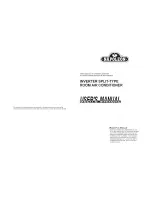
19
TURN OFF THE MAIN
ELECTRICAL POWER AT THE
BRANCH CIRCUIT DISCONNECT
CLOSEST TO THE UNIT BEFORE
ATTEMPTING ANY WIRING.
FAILURE TO DO SO CAN CAUSE
ELECTRICAL SHOCK RESULTING
IN PERSONAL INJURY OR DEATH.
WARNING
Heating Value of Gas
(BTU/Cu. Ft.) × 3600
Cu. Ft. Per Hr. Required =
Time in Seconds
(for 1 Cu. Ft.) of Gas
Start the furnace and measure the time required to burn one cubic foot of gas. Prior to
checking the furnace input, make certain that all other gas appliances are shut off, with
the exception of pilot burners. Time the meter with only the furnace in operation.
IMPORTANT NOTE FOR ALTITUDES ABOVE 2,000 FEET (610 METERS):
The main
burner orifices in your furnace and in these kits are sized for the nameplate input and
intended for installations at elevations up to 2,000 feet in the USA or Canada, or for ele-
vations of 2,000 - 4,500 feet (610 -1,373 meters) in Canada if the unit has been derated
at the factory. For elevations above 2,000 feet (610 meters)
IN THE USA ONLY
(see
ANSI-Z223.1), the burner orifices must be sized to reduce the input 4% for each 1,000
feet (305 meters) above sea level.
NOTICE: DERATING OF THE HEATING INPUT FOR HIGH ALTITUDE IN THE FIELD
IS UNLAWFUL IN CANADA (REFER TO CAN/CGA 2.17). UNITS INSTALLED IN
ALTITUDES GREATER THAN 2,000 FEET (610 METERS) MUST BE SHIPPED FROM
THE FACTORY OR FROM A FACTORY AUTHORIZED CONVERSION STATION WITH
THE HEATING INPUT DERATED BY 10% SO AS TO OPERATE PROPERLY IN ALTI-
TUDES FROM 2,000 - 4,500 FEET (610 - 1,373 METERS).
250,000 ONE
13.0
14.4 15.0
15.8
36.0
TEN 2 10 2 24 2 30 2 38 6 0
ONE
10.8 12.0 12.5 13.2 30.0
300,000 TEN 1 48 2 0 2 5 2 12 5 0
ONE
9.3 10.3 10.7 11.3 25.7
350,000 TEN 1 33 1 43 1 47 1 53 4 17
ONE 8.1 9.0 9.36 9.9
22.5
400,000 TEN 1 21 1 30 1 36 1 39 3
45
METER TIME IN MINUTES AND SECONDS FOR NORMAL
INPUT RATING OF FURNACES EQUIPPED FOR NATURAL
OR LP GAS
INPUT
BTU/HR
METER
SIZE
CU. FT.
HEATING VALUE OF GAS BTU PER CU. FT.
900
1000
1040
1100
2500
MIN. SEC. MIN. SEC. MIN. SEC. MIN. SEC. MIN. SEC.
TABLE 3
FIGURE 19
CONDENSATE DRAIN
DO NOT OVERTIGHTEN DRAIN FITTING
D. CONDENSATE DRAIN
IMPORTANT: Install a condensate trap to ensure proper condensate drainage. See
Figure 19.
The condensate drain pan has a threaded female 1 inch NPT (11.5 TPI) connection.
Consult local codes or ordinances for specific requirements of condensate drain piping
and disposal.
• To use the removable drain pan feature of this unit, some of the condensate line joints
should assembled for easy removal and cleaning.
• Use a thin layer of Teflon tape or paste on drain pan connections and install only hand
tight.
• Do not over tighten drain pan connections as damage to the drain pan may occur.
• Drain line MUST NOT block service access panels.
• Drain line must be no smaller than drain pan outlet and adequately sized to accommo-
date the condensate discharge from the unit.
• Drain line should slope away from unit a minimum of 1/8” per foot to ensure proper
drainage.
• Drain line must be routed to an acceptable drain or outdoors in accordance with local
codes.
• Do not connect condensate drain line to a closed sewer pipe.
• Drain line may need insulation or freeze protection in certain applications.
IV. WIRING
A. POWER SUPPLY
1.
All wiring should be made in accordance with the National Electrical Code.
Consult the local power company to determine the availability of sufficient power to
operate the unit. Check the voltage at power supply to make sure it corresponds to
!
















































